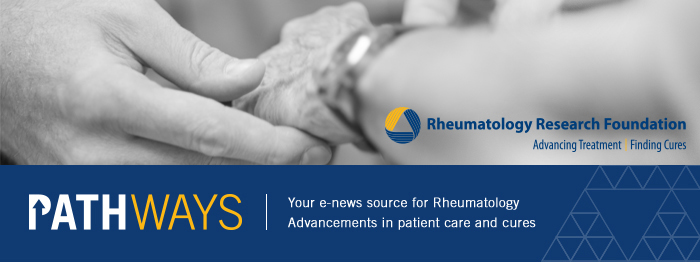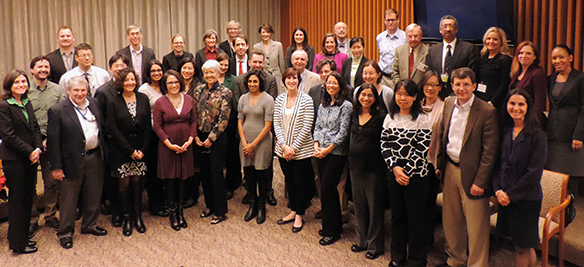Pathways

Volume 4, Issue 1 • January 2015 • Rheumatology Research Foundation
This year marks the 30th anniversary of the Rheumatology Research Foundation! To celebrate 30 years of advancing treatment of rheumatic diseases, this year the Foundation will profile 30 people who have made a significant impact in the world of rheumatology through their work with the Foundation. Please feel free to email us if you would like to contribute a story about how the work of the Foundation has directly impacted your life, or if you would love an opportunity to share your story or brag about your rheumatologist. We would love to hear from you!
30 Over 30: Arthur Weaver, MD, MS
Arthur Weaver, MD, MS, the first president of the Rheumatology Research Foundation, reflects on the Foundation’s last 30 years and looks toward the next 30.
Q: How did you get involved with the Foundation?
A: It was 1985 and the American College of Rheumatology (ACR) was in its infancy. I was a member of the ACR board in the mid-1980’s and was elected to be the first president of the ACR’s new foundation, then known as the Research and Education Foundation (REF). At the time, the Foundation had no funds of its own and the ACR itself was just beginning to gain momentum.
Q: What is the greatest impact you’ve seen the Foundation make in the last 30 years?
A: The Foundation started slowly with a few thousand dollars raised from ACR members in the first few years. However, it soon became apparent that increased funding was needed for rheumatology training, education and research as funding from the National Institutes of Health (NIH) and the Arthritis Foundation had decreased significantly. Since then, the growth of the Foundation has been phenomenal. In just a few short years, the Rheumatology Research Foundation has become the largest private funding source for rheumatology research and training programs in the US. This critical funding has led to significant diagnostic and therapeutic advancements and an increased number of rheumatologists in the field.
Q: What do you want people to know about the Foundation?
A: What impresses me the most is that the Foundation has consistently received the highest rating possible from Charity Navigator, four stars. The Foundation is committed to making sure every dollar raised goes directly to rheumatology research, education and training. Recent studies predict that 70 million people in the US will be impacted by arthritis and other rheumatic diseases by 2030, which is why the Foundation is particularly important now and needs to continue to grow.
Q: What do you hope to see the Foundation achieve over the next 30 years?
A: We have seen tremendous diagnostic and therapeutic advances in rheumatology over the past three decades. Over the next 30 years, I hope to see the Foundation receive continued and increasing support from the rheumatology community and an expanded public and patient awareness. As the Foundation achieves these goals, I foresee an increased number of well-trained rheumatologists and support personnel, further diagnostic and therapeutic advances, and cures for several rheumatic diseases.
Helping Critical Rheumatology Research Survive and Thrive
One junior investigator who received support from the Rheumatology Research Foundation for essential research into rheumatic diseases now has a better understanding of what it takes to move her research forward. Julia Charles, MD, PhD, along with a handful of other Foundation awardees, were among investigators supported by the National Institute of Arthritis and Musculoskeletal and Skin Diseases (NIAMS) who presented their research at the Institute’s annual Forum for Clinical Mentored K Awardees. Dr. Charles says while there, she learned more about how to advance her research. She adds that the Foundation provided integral funding along her path to earning support from NIAMS and impacting future treatments for patients.
Dr. Charles is an associate physician and instructor at Brigham and Women’s Hospital/Harvard Medical School. Her research focuses on osteoclasts, the only type of cell known to destroy bone. In some diseases, like rheumatoid arthritis (RA), osteoclasts become overactive and destroy bone in areas they don’t usually impact, such as joints. Dr. Charles was invited to the December forum because her research is currently being funded by a NIAMS K08 award, which supports mentored research projects that help develop the careers of clinical scientists. She is studying the origin of osteoclasts, how the cells that become osteoclasts increase in inflammatory arthritis, and how they suppress the immune system. She explains that her work could have a big impact on how people with rheumatic diseases are treated. “I hope that the kinds of questions I am trying to answer will eventually help inform more effective and novel ways to prevent erosions and bone loss in RA and other inflammatory arthritis conditions.”
According to Dr. Charles, the Rheumatology Research Foundation is a large part of the reason she has been able to continue her critical research and garner support from NIAMS, which is part of the National Institutes of Health (NIH). Shortly after she finished her fellowship at the University of California, San Francisco, Dr. Charles received the Investigator Award from the Foundation, which helps young researchers investigate novel ideas while they work to become independent. Dr. Charles says because of the Foundation award, she was able to gather ample preliminary data and publish enough of her work to earn even more extensive financial support through her K award. For investigators like Dr. Charles, K awards from the NIH are an integral step in advancing their research and becoming established in the field.
The Foundation is also helping fund Dr. Charles’ current research with its Career Development Bridge Funding Award: K Supplement, which helps investigators who have an NIH clinical mentored K award expand their research. Dr. Charles, who is in the third year of her K08 award, says the Foundation’s support is invaluable. “The K supplement award has allowed me to hire a technician, which gives me some time to do the reading, writing, and most importantly, thinking that is essential to bringing my projects to fruition.” Dr. Charles says with the additional funding from the Foundation, she is also able to research the functions osteoclasts may serve beyond bone destruction.
 |
Pictured are those who attended the NIAMS Forum for Clinical Mentored K Awardees, including several K awardees, NIAMS staff members and representatives from outside organizations like the Rheumatology Research Foundation.
|
Now, Dr. Charles is looking to the future of her research and her career. While at the forum, she and other K awardees learned more about other grant opportunities and the next steps in furthering their studies. Dr. Charles says she plans to apply for several grants through NIAMS, including an R01 award, which provides significant support for critical research and would allow her to work as an independent investigator. During that process, the Rheumatology Research Foundation will offer Dr. Charles and other rheumatology investigators the opportunity to keep the research going and to stay in their field of study, even if they hit bumps in the road, with awards that bridge funding gaps during the application process. For NIAMS leadership, this support is an excellent example of how the NIH and private non-profits, like the Foundation, can work together to ensure the survival of critical research that will lead to major breakthroughs. “These Foundation programs can provide a real synergy with NIH funding for early-career stage researchers,” said NIAMS Director Stephen I. Katz, MD, PhD. “Such partnerships provide a way for us to leverage our respective resources to foster the retention of talented young investigators, especially in these times of tight budgets and highly competitive funding.”
Leaders with the Foundation say having so many former Foundation award recipients among those presenting their research at the NIAMS forum was a proud moment for the organization. Timothy Niewold, chair of the Foundation’s Scientific Advisory Council (SAC), attended the forum as well. “It was inspiring to see the Foundation so well represented by investigators like Dr. Charles,” says Dr. Niewold. “It’s a wonderful example of how the Foundation is helping to keep these researchers at the bench. It is truly an honor for the Foundation to be offering these promising investigators the funds they need to eventually earn more substantial support from the NIH for vital research that will help rheumatology professionals better treat their patients.”
As for Dr. Charles, she will use what she learned at the forum to seek out grants and awards that will support her search for answers to questions about osteoclasts, what role they play in inflammatory arthritis, and how that knowledge can be used to better treat patients. She will also always be grateful for the Foundation’s help in getting her research off the ground and helping it continue. “I really owe the Foundation for my career.” She explains, “Funding from the Foundation is essential for encouraging fellows to pursue research and keeping junior people like me in the game long enough to be successful in getting funding from the NIH.”